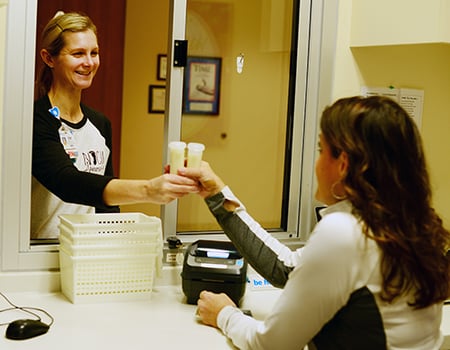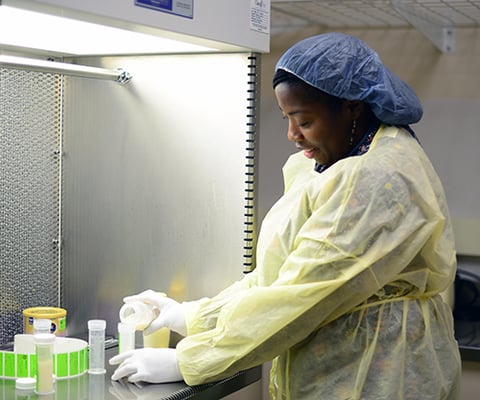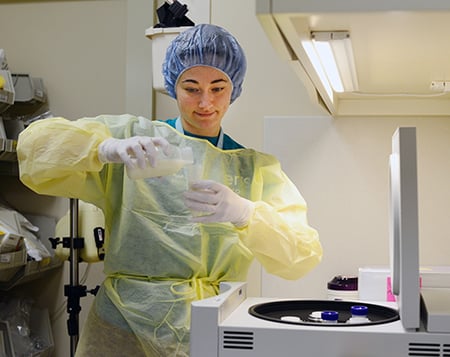
How babies at the Children’s Wisconsin NICU get personalized milk every day
Human milk is an amazing and complex substance — in fact, in a single feeding or pumping session, a mother’s milk can change from watery to a higher-fat milk to an extremely rich, calorically dense “hind milk.” Studies show that premature babies have improved growth and health outcomes when given human milk as opposed to formula.
That’s why staff at Children’s Wisconsin is dedicated to ensuring that every baby can receive human milk. A team of experts including certified lactation specialists, neonatologists, registered dietitians, milk technicians and registered nurses all work together to ensure that each baby gets the precise formula of milk-based nutrition that will help them grow and thrive. That includes babies whose mothers cannot provide breast milk — as the Children’s Wisconsin NICU also receives donated milk from the Mother’s Milk Bank of the Western Great Lakes.
Engineering milk
 In the NICU’s devoted milk kitchen, a mother’s milk is received, coded and stored. It is also analyzed for caloric and fat content using a device called the Creamatocrit. But that’s just the beginning.
In the NICU’s devoted milk kitchen, a mother’s milk is received, coded and stored. It is also analyzed for caloric and fat content using a device called the Creamatocrit. But that’s just the beginning.
Each morning, Beth Polzin, registered dietitian at Children’s Wisconsin, and the clinical nutrition NICU team reviews every single infant in the NICU for their nutritional needs. Then they create individualized orders for each baby’s nutrition, starting with breast milk.
Various nutritional supplements are added to the milk, including additional carbohydrates and proteins, fats, vitamins and minerals. Each baby’s milk is specially formulated for them according to their growth and gestational age, nutritional needs related to their diagnosis, and how they will receive their nutrition — either through a feeding tube directly into their body, or orally with a syringe or bottle.
“We do all that hard work behind the scenes and deliver the baby’s food right to their bedside, which enables the nurses to focus on what they do best: caring for babies,” said Beth.
State-of-the-art milk kitchen
 Although Children’s Wisconsin has long supported families in providing breast milk to their babies, in 2015 a state-of-the-art milk kitchen was built to provide up-to-date technology for storing and enhancing milk.
Although Children’s Wisconsin has long supported families in providing breast milk to their babies, in 2015 a state-of-the-art milk kitchen was built to provide up-to-date technology for storing and enhancing milk.
Mothers or families drop their milk off at a window to the milk kitchen. It is then barcoded, logged and stored in one of the kitchen’s 12 commercial freezers. Milk is analyzed for nutritional content, and, if needed, spun with a centrifuge machine that separates out the milk fat creating fat-free skim milk that is the optimal food for some babies.
When it’s time for a feeding, based on the baby’s nutritional needs that day, a mother’s milk is thawed and fortified in a separate milk preparation room by a certified milk technician. “Having this special sterile environment in which to prepare milk decreases the amount of air coming in contact with the milk, which decreases risk of infection and contamination,” said Barbara Hayes-Dineen, international board certified lactation consultant at Children’s Wisconsin. “It also decreases waste — which is important because a mother’s milk is a precious ingredient.:
Empowering moms
Moms who go into premature labor and give birth early often experience a sense of loss — the loss of their dream of a full-term birth, the loss of the ability to bring their baby home right away, and the loss of their expectation that their baby will have no serious health issues. Another loss that many moms experience is the ability to breastfeed their baby from birth.
“Having a baby who is ill in the NICU is one of the most difficult and stressful times parents will face,” said Barbara. “When moms have the ability to nourish their babies through pumping and feeding of breast milk, they are more engaged and connected to their baby and feel a greater sense of control.” This is especially important in the NICU, when moms can feel overwhelmed or out-of-control when faced with ongoing worries and anxiety about their child.
For the mom of 5-week-old old Grayson, knowing her baby was being nourished by her breast milk meant a lot. “It feels good to be able to do something,” she said, “especially when I couldn’t always be here in the NICU with him.”
Beth and Barbara see moms and families every day who are grateful for the chance to be part of their child’s nutrition. When rounding in the NICU with doctors, nurses, pharmacists, medical students and fellows, they talk with families about how things are going for them and work with them to develop their baby’s nutritional plan.
Cutting-edge research
 The milk kitchen not only helps babies in the NICU, but other infants in the hospital as well — including babies with chylothorax, a condition where fluid builds up in the chest cavity and can put babies at risk for malnutrition and muscle loss.
The milk kitchen not only helps babies in the NICU, but other infants in the hospital as well — including babies with chylothorax, a condition where fluid builds up in the chest cavity and can put babies at risk for malnutrition and muscle loss.
Beth is part of a team that is researching how to best supply fortified, skimmed breast milk to these babies, which is the optimal way for them to get nutrition. Their work has been published and continued research will influence other hospitals to use best practices in feeding babies with this condition.
Sending families on their way
The milk kitchen helps babies get the best possible start at Children’s Wisconsin. But in working with families to provide personalized feeding for their babies, it also empowers parents to continue providing breast milk to their babies.
Beth works with families at discharge to design a feeding plan, and some families will continue fortifying breast milk at home.
“Many of these families are just overwhelmed with gratitude,” said Beth. “This is my job, but to them it is so much more than that. They feel ready and empowered to go home and have this special time with their baby.”
Children's Wisconsin Resources

Written by
Katie Lott
Writer
Related Stories
No related articles found.



